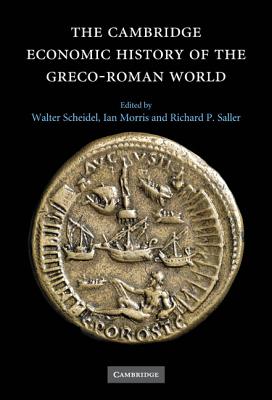

 Cambridge University Press
Cambridge University Press
The Cambridge Economic History of the Greco-Roman World


Key Metrics
- Walter Scheidel
- Cambridge University Press
- Hardcover
- 9780521780537
- 9.04 X 6.3 X 2.38 inches
- 3.57 pounds
- History > Ancient - Greece
- English
 Secure Transaction
Secure TransactionBook Description
Author Bio
Walter Scheidel's research ranges from ancient social and economic history and premodern historical demography to the comparative and transdisciplinary world history of inequality, state formation, and human welfare. He is particularly interested in connecting the humanities, the social sciences, and the life sciences.
The world's second most cited Roman historian in an active faculty position, Scheidel is the author or (co-)editor of 20 books, has published more than 250 articles, chapters, and reviews, and has lectured in 30 countries.
His most recent books are The Oxford World History of Empire (2 vols., 2021, co-edited with Peter Bang and the late Christopher Bayly), Escape from Rome: The Failure of Empire and the Road to Prosperity (2019), The Science of Roman History: Biology, Climate, and the Future of the Past (2018, ed.), The Great Leveler: Violence and the History of Inequality from the Stone Age to the Twenty-First Century (2017; 12 translations), On Human Bondage: After Slavery and Social Death (2017, co-edited with John Bodel), State Power in Ancient China and Rome(2015, ed.), and Fiscal Regimes and the Political Economy of Premodern States (2015, co-edited with Andrew Monson). Other key publications include Rome and China: Comparative Perspectives on Ancient World Empires (2009, ed.), The Cambridge Economic History of the Greco-Roman World (2007, co-edited with Ian Morris and Richard Saller), and Death on the Nile: Disease and the Demography of Roman Egypt (2001).
He has also written for the New York Times, Financial Times, Atlantic, Economist, Le Monde, Foreign Affairs, Boston Globe, Huffington Post, Spectator, and other media outlets.
Scheidel is currently working on the Roman monarchy in global comparative context and on a very short book on the past, present and future of the study of ancient history, and is planning longer works on counterfactual history, on typological and evolutionary perspectives on the ancient world, and on how modernizing developmental discontinuities enrich, divide and threaten humankind. He launched an international research initiative for the comparative study of ancient Mediterranean and Chinese empires, co-founded the Princeton/Stanford Working Papers in Classics, created the interactive web site Orbis: The Stanford Geospatial Network Model of the Roman World, which has received over a million visits and attracted global media coverage, and is an editor of the monograph series Oxford Studies in Early Empires and a former editor of the journal Historia.
For about a decade, Scheidel taught as a Catherine R. and Daniel L. Grossman Fellow in Stanford's Human Biology program. He was awarded a New Directions Fellowship by the Mellon Foundation and a Guggenheim fellowship, and is a Corresponding Member of the Austrian Academy of Sciences.
Source: Stanford University Department of Classics
Videos
No Videos
Community reviews
Write a ReviewNo Community reviews